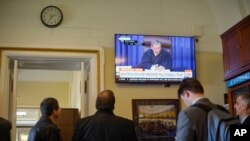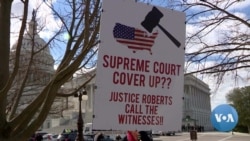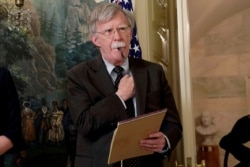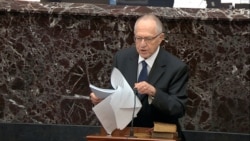The U.S. Senate will spend a final day Thursday questioning President Donald Trump’s defense team and the House lawmakers prosecuting his impeachment case, as a decision looms about allowing witnesses.
How quickly the proceedings come to a close will be determined by whether the Republican-majority will approve a request from Democrats to hear from key administration officials. The issue dominated Wednesday’s first session, during which senators submitted written questions.
The spotlight was on John Bolton, the former national security adviser who wrote in a yet-to-be-published book that Trump told him he was withholding $391 million in military aid to Ukraine until President Volodymyr Zelenskiy publicly announced a corruption investigation into Democratic presidential challenger Joe Biden.
Democrats insist Bolton and others must be called as witnesses. Most Republicans, who say Trump did nothing wrong in freezing the aid to Ukraine, do not want Bolton or anyone else subpoenaed or any new evidence entered.
WATCH: Senators Take Turns Asking Questions at Trump Impeachment Trial
House testimony
According to testimony during the House of Representatives’ impeachment investigation, Bolton voiced his concerns about Trump withholding the aid and asking for the Biden investigation to several White House officials, at one point calling it a “drug deal” he wanted no part of.
Democrat Adam Schiff of the House Intelligence Committee appealed to the senators to judge Bolton’s credibility for themselves.
“When you have a witness as plainly relevant as John Bolton who goes to the heart of the most serious and most egregious of the president’s misconduct, who has volunteered to come and testify, to turn him away ... is deeply at odds with being an impartial juror.”
But a Trump lawyer, deputy White House counsel Patrick Philbin, accused the Democrat-controlled House of approving two articles of impeachment against Trump in a “hurried, half-baked, partisan fashion” and that to call witnesses now “could drag (the Senate trial) on for months.”
“The real question is what is the precedent that is going to be set for what is an acceptable way for the House of Representatives to bring an impeachment of a president of the United States to this chamber?” Philbin asked.
NSC: Book can’t be published
A top official at the National Security Council wrote a letter to Bolton’s attorney last week that the book cannot be published in its current form because she says it contains a significant amount of classified information, including some that is top secret. She said the NSC is still reviewing the manuscript.
Bolton’s lawyer released an e-mail response to the NSC Wednesday, disputing its assessment.
The Senate plans to vote Friday whether to allow Bolton and other relevant witnesses to testify. Fifty-one votes are needed, which means at least four Republicans would have to join the 47 Democrats and independents. Republican Senate Majority Leader Mitch McConnell conceded Tuesday that he may not have the votes to prevent the subpoenas.
The Senate will decide whether to convict Trump on two articles of impeachment and remove him from office — abuse of power and obstructing Congress.
Reelection in ‘public interest’
Trump attorney Alan Dershowitz argued that even if Trump did ask President Zelenskiy for a political favor in exchange for aid, it is not impeachable.
“Every public official that I know believes that his election is in the public interest ... and if a president did something that he believes will help him get elected, in that public interest, that cannot be the kind of quid pro quo that results in impeachment,” he said.
Several legal scholars called his argument nonsense.
Trump has steadfastly insisted he did nothing wrong. Republicans say he released the aid to Ukraine without Zelenskiy launching the Biden investigation, proving there was no reciprocal quid pro quo deal with Kyiv.
The president’s lawyers say he had the authority to hold up the aid because of concern about corruption in Ukraine and the insistence that Europe pitch in more to help Ukraine fight Russian-backed separatists.
However the debate plays out over witnesses, Trump remains almost certain to be acquitted.
A two-thirds vote in the 100-member Senate is needed to convict Trump and remove him from office. But with Republicans holding a 53-47 majority and no Republican calling for his ouster, Trump is all but assured of being exonerated.










